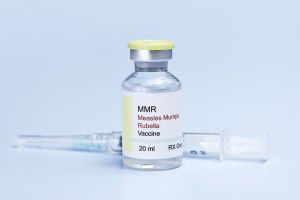|
www.HealthyHearing.com |
Mumps and hearing lossSeveral vaccine-preventable viral infections linked to hearing loss
Contributed by Debbie Clason, staff writer, Healthy Hearing A mumps infection only lasts for a couple of weeks, but the effects can be lifelong–especially for your hearing. The viral infection has been on the rise lately with the reported number of cases increasing from slightly more than 1,000 in 2015 to more than 6,000 in 2016 and 2017. A winter 2019 outbreak in the U.S. Northeast, for example, prompted public health officials to urge parents to vaccinate their children and themselves as they scrambled to contain the highly contagious viral illness. Fortunately, in more recent years, CDC data for mumps shows case numbers are much lower. What are mumps?
mumps and rubella. All three infections can cause hearing loss as a possible complication. Mumps, which got its name from an Old English word meaning "grimace," belongs to the same family of viruses known to cause measles and several common respiratory infections. It spreads easily from person to person through infected saliva, typically when a person coughs or sneezes. It generally takes about two weeks for a person to become sick after being exposed. Children are more affected than adults. It is one of many infections linked to hearing loss and ear ringing. What are the symptoms of mumps?Mumps is perhaps best known for causing painful swelling of the salivary glands on one or both sides of the face. Other symptoms include:
Are there complications?Yes. Besides hearing loss, mumps can cause inflammation and swelling in other parts of the body, including the testicles, pancreas, ovaries and breasts, brain (encephalitis), and membranes and fluid around the brain and spinal cord (meningitis). Fortunately, most of these complications are rare. For example, research indicates that only about 1-4% of people who get infected with mumps experience hearing loss, though the exact rate is unknown. If you or your child experience any of these complications, see a doctor ASAP. How does mumps cause hearing loss?We still don't know exactly how mumps causes damage to hearing. Some experts think it may damage the cochlea, the snail-shaped structure in your ear that house stereocilia and the stria vascularis. Stereocilia, otherwise known as hair cells, translate sound vibrations into nerve impulses for the brain to interpret as sound. The stria vascularis supplies blood to the inner ear. Other potential sites of damage are the auditory nerve or brainstem regions. All of these parts of the ear are critical for how we hear. Those who lose hearing as a result of mumps most likely have sensorineural hearing loss, or damage to the sensory cells and nerves responsible for hearing. The hearing loss is almost always in one ear—known as unilateral hearing loss or single-sided deafness. Sometimes the loss is reversible but it may be severe and permanent, meaning a child loses most of their hearing in one ear. Treatment for hearing lossMeasles and rubella also can cause hearing loss. If the hearing loss is permanent, there are several options that can improve hearing and communication:
Can mumps be prevented?Your best defense against the disease is immunization. Talk to your pediatrician about vaccination schedules for your children as well as adult members of your family who have not yet had the mumps and haven't been vaccinated—or need a booster shot.
The vaccine is generally given three times—right around a child's first birthday, again at kindergarten age, and finally in high school or college. That final booster is important: Evidence shows that people who have had two or fewer mumps vaccines are more at risk than those who have had all three. The mumps vaccine is commonly administered together with measles and rubella and is known as the MMR vaccine, or MMRV if varicella (chicken pox) is included. Medical professionals believe this vaccine provides about 80 percent long-term immunity against the diseases, yet outbreaks still occur—mostly due to lack of vaccination. Adults born before 1957 who haven’t yet contracted mumps should consult their family doctor about receiving an immunization, especially if they work in a high-risk environment, such as a hospital or school, or near a current mumps outbreak. If you do suspect hearing lossIn the rare event you or a member of your family experience hearing loss after mumps, schedule an appointment with a hearing healthcare professional as soon as possible. Ask your family physician for a referral or search for hearing aid clinics near you. Debbie Clason, staff writer, Healthy Hearing
Related Help Pages:
Hearing loss Causes Children's hearing loss Cochlear implants Bone-anchored hearing systems
|
Featured clinics near me
Earzlink Hearing Care - Reynoldsburg
7668 Slate Ridge Blvd
Reynoldsburg, OH 43068

Find a clinic
Need a hearing test but not sure which clinic to choose?
Call 1-877-872-7165 for help setting up a hearing test appointment.


 Debbie Clason holds a master's degree from Indiana University. Her impressive client list includes financial institutions, real estate developers, physicians, pharmacists and nonprofit organizations.
Debbie Clason holds a master's degree from Indiana University. Her impressive client list includes financial institutions, real estate developers, physicians, pharmacists and nonprofit organizations.